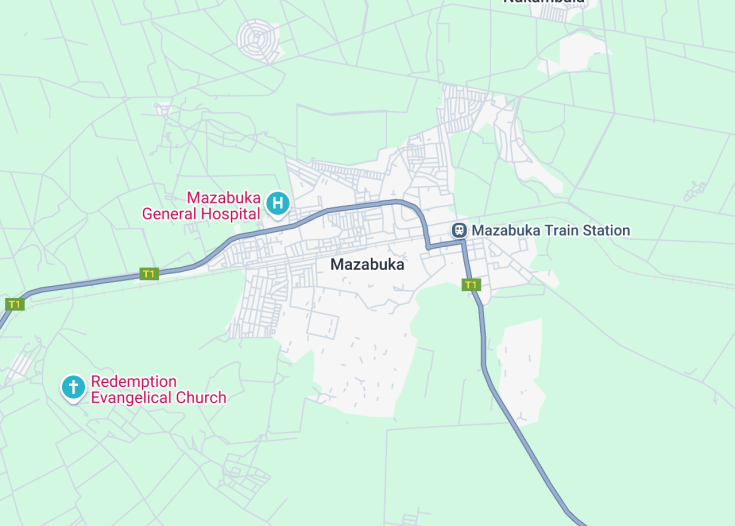Mazabuka, known as the “Sweetest Town in Zambia,” is an essential destination for those exploring Zambia’s Southern Province. Renowned for its vast sugar cane plantations and as the hub of Zambia’s sugar industry, Mazabuka offers a unique glimpse into the country’s agricultural heritage. Visitors can explore local farms, participate in sugar production tours, and enjoy fresh sugar-related products. The town also serves as a cultural gateway with its vibrant local markets and annual cultural events, providing a deep dive into the rich traditions and community life of Zambia.
When visiting Mazabuka, be sure to schedule a guided tour of the sugar plantations. These tours offer insightful experiences into the sugar-making process and local agribusiness.
Consider visiting during the Sugar Festival, typically held in September, to experience local cuisine, music, and dance that celebrate the town’s sugar heritage.
Top things to do & see in Mazabuka
Select the following sights and activities to discover best tickets and tours available in Mazabuka.
Mazabuka: The Sweet Heart of Zambia
| Country | Zambia |
| Time in Mazabuka | GMT+2 |
| Language spoken | Bemba, Nyanja, English |
| Population | 48,000 (2022 estimate, World Population Review) |
| Currency | Zambian Kwacha (ZMW, K) |
| Airports |
|
Mazabuka, a significant town in the Southern Province of Zambia, serves as a key economic and cultural hub. Known primarily for its vast sugar cane plantations, Mazabuka is often referred to as the ‘Sugar Town’ of Zambia. This region is home to one of the largest sugar companies in Africa, contributing extensively to Zambia’s economy and providing employment to thousands of residents. The town’s strategic location, south of Lusaka and on the Great North Road, facilitates its role in commercial and transport activities. Mazabuka also boasts a rich cultural tapestry, with its population predominantly consisting of Tonga-speaking people, alongside other ethnic groups such as the Nyanja and Bemba. The annual Lwiindi Ceremony, held in the nearby Monze District, and various traditional festivities in Mazabuka draw visitors from across the region. These cultural events, along with its economic significance, make Mazabuka a pivotal location in Zambia’s socio-economic landscape.
Where is Mazabuka?
Positioned in the heart of Zambia’s Southern Province, Mazabuka lies approximately 55 miles south of the capital, Lusaka.
Distances:
| Route | Distance by car | Time by car |
|---|---|---|
| Lusaka to Mazabuka | 55 miles | 1 hour 30 minutes |
| Livingstone to Mazabuka | 150 miles | 3 hours 20 minutes |
What is Mazabuka famous for?
Mazabuka is famously known as the ‘Sugar Town’ due to its massive sugar-cane fields and production facilities. It houses some of the largest sugar refineries in Africa, contributing significantly to Zambia’s economy.
History
Pre-1900: Indigenous Beginnings
Long before colonial footprints marked its soil, the area now known as Mazabuka was inhabited by the Tonga people, one of the oldest ethnic groups in Zambia. The region was primarily used for fishing, hunting, and small-scale agriculture, which thrived due to the region’s fertile lands and favorable climate.
1900-1964: Colonial Influence and Development
The advent of European settlement began in earnest in the early 20th century. The discovery of sugarcane’s viability drastically transformed Mazabuka. Large-scale sugar plantations began to develop, particularly by the British South Africa Company. This era also saw the construction of the railway line which significantly enhanced trade and mobility, further anchoring Mazabuka’s role in Zambia’s sugar industry.
1964-present: Independence and Modernization
Post-independence, Mazabuka continued to flourish as a sugar cane industry hub. The establishment of the Nakambala Sugar Estate in the late 1960s, one of the largest in Africa, marked a significant economic boost. Today, Mazabuka is not only pivotal in sugar production but also in promoting agro-based economic activities, showcasing a blend of traditional lifestyles and modern economic developments.
Visit Mazabuka
What to see and do in Mazabuka
Mazabuka offers a variety of attractions and activities that appeal to both history enthusiasts and nature lovers:
- Explore the Nakambala Sugar Estate: Understand the process of sugar production from field to factory.
- Visit the local markets: Engage with the locals and purchase traditional Tonga crafts and fresh produce.
- Outdoor activities: Enjoy bird watching or fishing along the Kafue River, which offers serene landscapes and rich biodiversity.
Annual Events in Mazabuka
Mazabuka hosts several cultural and economic events annually. Notably, the Mazabuka Sugar Festival, held in September, celebrates the region’s rich history in sugar production with exhibitions, music, and dance.
Best time to visit Mazabuka
The ideal time to visit Mazabuka is during the dry season, from May to August. During these months, the weather is most favorable for outdoor activities and exploring the sugarcane fields.
is Mazabuka worth visiting?
Mazabuka offers a unique slice of Zambian rural life and its integral role in the sugar industry makes it a fascinating destination for those interested in economic history and agriculture. Its blend of cultural heritage and natural beauty, coupled with warm local hospitality, makes Mazabuka a noteworthy destination for both educational and leisurely visits.









